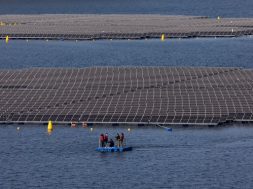
From next year, meters in Tamil Nadu will record solar energy consumption
From next year, meters in Tamil Nadu will record solar energy consumption
Besides encouraging electricity consumers to set up solar energy systems, the policy objective is to establish a single-window system to set up solar energy systems.
CHENNAI: From next year, your new service connection electricity meters won’t only configure your usual power consumptions, it will also be designed to read your solar energy consumption as per the Solar Policy 2018 drafted by Tamil Nadu Energy Development Agency.
Under the proposed policy, all new service connection metres in Tamil Nadu will be configured for bi-directional energy recording and display so that all new service connections and existing service connections for which meters are replaced during maintenance will effect solar energy net metering.
The configuration for bidirectional energy is expected to begin from April, 2019, the draft solar policy states, adding that the state is projected to have installed solar energy generation capacity of 8,884 MW by 2022, of which 40 per cent will be met by consumer scale solar energy generators.
As per the policy, the state will have dedicated energy storage feed-in tariff which shall be determined by the Tamil Nadu Electricity Regulatory Commission. The tariff shall be designed to incentivise solar energy export to grid at peak demand hours.
Not only that, all public buildings in the state will be mandated to meet 30 pc of their energy requirements by solar energy by 2022. Streetlights and water supply installation of corporations, municipalities and local urban bodies are mandated to meet 30 pc of their energy requirements from solar energy by 2022. Even state departments will have to replace 10 pc of existing vehicle fleet with solar powered vehicles by 2022.
The new draft policy, which intends to create a framework that enables an accelerated development of solar energy in state, also offers incentives. These include exemption from electricity tax, grid connectivity, open access, wheeling, banking and cross subsidy charges.
Besides encouraging electricity consumers to set up solar energy systems, the policy objective is to establish a single-window system to set up solar energy systems.
The policy states that the focus is not only on reducing carbon and water footprint but also making the state emerge as an international climate leader for emerging economies by 2022. The policy’s lifespan is expected to be five years with the government monitoring it every year to evaluate the actual results against policy objectives and capacity addition targets by the state.
The policy encourages rooftop solar plants on buildings and suggests group Net metering whereby surplus energy exported to grid from solar plant in excess of 100 pc of imported energy at the location of solar plant can be adjusted in any other power service connections. The solar energy group net metering will be available to all electricity consumer categories and tariffs and for service connections at any voltage level. For those who are not having suitable roof, there will be a facility of Virtual Net Feed-In, where consumers can be part of collectively owned solar system.
All energy produced by a collectively owned solar system will be fed into the grid through an energy meter and the exported energy, as recorded by the meter, will be pro rata credited to the power bills of each participating consumer on the basis of beneficial ownership, the policy states.
Powering ahead
- All public buildings will be mandated to meet 30 pc of energy requirements from solar energy
- by 2022
- Street-lights and water supply installation of corporations, municipalities and the local urban bodies are mandated to meet 30 pc of energy requirements from solar energy
- All state govt departments shall replace 10 pc of their existing vehicle fleet with solar powered electric vehicles
- From April 2019, all new service connection metres in TN will be configured for bidirectional energy recording and display so that it is ready for effecting solar energy net metering
- The Directorate of Town and Country Planning in collaboration with local bodies will amend building bylaws to mandate Energy Conservation Building Code (ECBC)
















